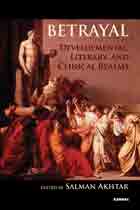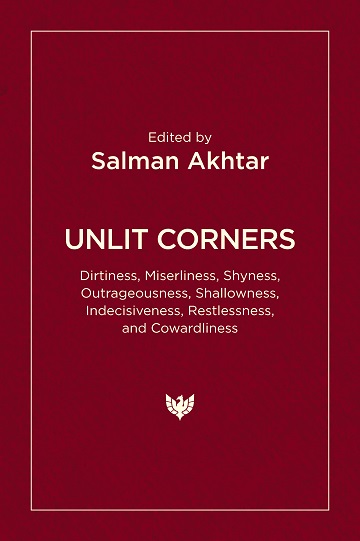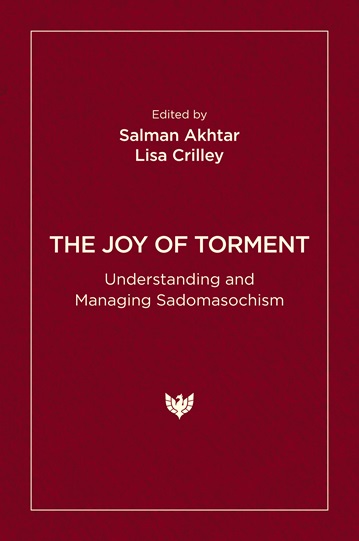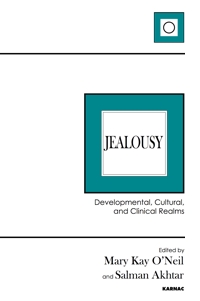Betrayal: Developmental, Literary, and Clinical Realms

Book Details
- Publisher : Routledge
- Published : June 2013
- Cover : Paperback
- Pages : 248
- Category :
Bargain and Discounted Titles - Category 2 :
Psychoanalysis - Catalogue No : 34202
- ISBN 13 : 9781782200154
- ISBN 10 : 1782200150
Also by Salman Akhtar
There are currently no reviews
Be the first to review
Betrayal underlies all psychic trauma, whether sexual abuse or profound neglect, violence or treachery, extramarital affair or embezzlement. When we betray others, we violate their confidence in us. When others betray us, they pierce the veil of our innocent reliance. Betraying and feeling betrayed are ubiquitous to the scenarios of trauma and yet surprisingly neglected as a topic of specific attention by psychoanalysis.
This book fills this gap. The first part deals with developmental aspects and notes that while the experience of betrayal might be ubiquitous in childhood, its lack of recognition by the parents is what leads to fixation upon it. Attention is also given to Oedipally-indulged and seduced children who feel betrayed later in the course of their development. Feelings of betrayal during early adolescence are also discussed. This section of the book closes with an account of situations where our bodies betray us. The realms of body image betrayal, body self betrayal, and the body’s ultimate betrayal via physical death are addressed.
The second part deals with literature and elucidates the myriad ways in which the theme of betrayal appears in Shakespeare’s writings and in Oscar Wilde’s poem The Ballad of Reading Gaol. The final part pertains to clinical matters and has chapters on the compulsion to betray others and the unconscious need to be betrayed, the betrayal of a sacred trust in the form of childhood sexual abuse, extra-marital affairs, and the betrayal of patients by their analysts in the form of boundary violations. In this last-mentioned situation, severe damage occurs not only to the analyst, to the particular patient whose boundaries he has violated, but also to other patients who hear about the transgression from the ‘grapevine.’ This chapter is a ‘must-read’ for all training institutes and especially their ethics committees. These thumb-nail sketches of the book’s chapters are intended to whet the reader’s appetite. Obviously, there is more texture, more substance, and more heuristic and technical material in their individual entirety.
Reviews and Endorsements
‘Given the prominence in the Western cultural imagination of such victims of betrayal as Oedipus and Jesus, and given Freud's own sense of betrayal by the likes of Adler, Jung, Rank and others, it is surprising that this topic has received so little attention in the psychoanalytic literature. Perhaps the theme of betrayal has been just too close to home. Salman Akhtar's illuminating essay on the compulsion to betray and the need to be betrayed forms the centerpiece of this collection of insightful papers that approach this important topic from developmental, literary and clinical perspectives.’
- Donald L. Carveth, PhD, Emeritus Professor of Sociology and Social & Political Thought, York University; Director, Toronto Institute of Psychoanalysis
‘With characteristic poignancy and poeticism, Salman Akhtar and his contributors signify betrayal, mine its phenomenology, decipher its scars, and formulate the fixations and transmissions patterned in its wake. Incisive and broadly humane, these essays lead us to sites of corruption and the particular ways they “pierce the veils of our innocent reliance”. Read this book and wander through the realms of human treachery. Though often disturbing, you will be a better clinician for it.’
- Andrea Celenza, PhD, Assistant Clinical Professor at Harvard Medical School, Faculty at the Boston Psychoanalytic Society and Institute and Massachusetts Institute for Psychoanalysis
About the Editor(s)
Salman Akhtar, MD, is professor of psychiatry at Jefferson Medical College and a training and supervising analyst at the Psychoanalytic Center of Philadelphia. He has served on the editorial boards of the International Journal of Psychoanalysis and the Journal of the American Psychoanalytic Association. His more than 450 publications include twenty-three solo authored books – Broken Structures (1992), Quest for Answers (1995), Inner Torment (1999), Immigration and Identity (1999), New Clinical Realms (2003), Objects of Our Desire (2005), Regarding Others (2007), Turning Points in Dynamic Psychotherapy (2009), The Damaged Core (2009), Comprehensive Dictionary of Psychoanalysis (2009), Immigration and Acculturation (2011), Matters of Life and Death (2011), Psychoanalytic Listening (2013), Good Stuff (2013), Sources of Suffering (2014), No Holds Barred (2016), A Web of Sorrow (2017), Mind, Culture, and Global Unrest (2018), Silent Virtues (2019), Tales of Transformation (2022), In Leaps and Bounds (2022), and In Short (2024) – as well as sixty-nine edited or coedited volumes in psychiatry and psychoanalysis. Dr. Akhtar has delivered many prestigious addresses and lectures including, most significantly, the inaugural address at the first IPA-Asia Congress in Beijing, China (2010). Dr. Akhtar is the recipient of the Journal of the American Psychoanalytic Association’s Best Paper of the Year Award (1995), the Margaret Mahler Literature Prize (1996), the American Society of Psychoanalytic Physicians’ Sigmund Freud Award (2000), the American College of Psychoanalysts’ Laughlin Award (2003), the American Psychoanalytic Association’s Edith Sabshin Award (2000), Columbia University’s Robert Liebert Award for Distinguished Contributions to Applied Psychoanalysis (2004), the American Psychiatric Association’s Kun Po Soo Award (2004), the Irma Bland Award for being the Outstanding Teacher of Psychiatric Residents in the country (2005), and the Nancy Roeske Award (2012). He received the Sigourney Award (2013), which is the most prestigious honor in the field of psychoanalysis. Dr. Akhtar is an internationally sought speaker and teacher, and his books have been translated in many languages, including German, Turkish, and Romanian. His interests are wide and he has served as the film review editor for the International Journal of Psychoanalysis, and is currently serving as the book review editor for the International Journal of Applied Psychoanalytic Studies. He has published eighteen collections of poetry and serves as a scholar-in-residence at the Inter-Act Theatre Company in Philadelphia. His Selected Papers (Vols I–X) were recently published and released at a festive event held at the Freud House & Museum in London.
Customer Reviews
Our customers have not yet reviewed this title. Be the first add your own review for this title.
You may also like
Turning Points in Dynamic Psychotherapy: Initial Assessment, Boundaries, Money,...
Salman Akhtar
Price £31.99










